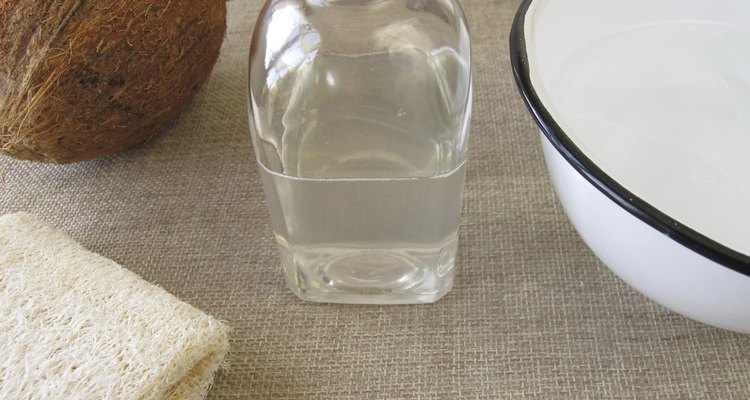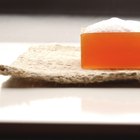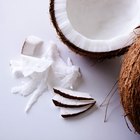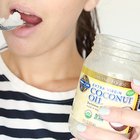
HeikeRau/iStock/Getty Images
Coconuts contain milk to drink, meat to eat and can even produce oil. The consistency of coconut oil will depend on the ambient room temperature. If the room temperature is lower than 77 to 79 degrees Fahrenheit, coconut oil will remain in its white solid state. Once the room temperature exceeds 79 degrees Fahrenheit, the coconut oil will start liquefying producing clear liquid coconut oil. The clarity of the oil will depend on the processing method used to produce the coconut oil.
Virgin Coconut Oil
The processing method used to produce extra virgin coconut oil helps to preserve the nutritional value, purity and clarity of the coconut oil. Other methods used to produce coconut oil commonly add perfumes, heat and flavoring agents in an attempt to give the oil a longer shelf life. These processes not only change the clear color of the oil but can also destroy some of the oil’s beneficial medium-chain triglycerides and medium-chain fatty acids.
Coconut Oil in Your Body
Oil is lauric acid. Your body converts lauric acid into monolaurin, a compound that has many anti-viral, anti-bacterial and anti-protozoal properties. Coconut oil also contains MCTs. This type of triglyceride is easier for your body to absorb than long-chain triglycerides. Most other types of seed and vegetable oils contain LCTs making it difficult for your body to absorb the triglycerides.
MCTs
The molecules in MCTs are smaller than the molecules in other types of triglycerides. This allows your liver to absorb the MCTs and convert them to energy quickly without the insulin spike associated with carbohydrates. Additionally, in the case of LCTs, your body commonly stores this type of triglyceride as fat. MCTs also do not require special enzymes for your body digest resulting in less strain on your digestive system then consuming LCTs. Further, as your body converts the MCTs to energy, your metabolism will stimulate potentially supporting weight loss.
Medicinal Benefits
Consuming clear liquid coconut oil can also help to improve your overall health. According to the book “Coconut Oil: Discover the Key to Vibrant Health,” coconut oil can support your immune, cardiovascular and digestive systems. Coconut oil can also help to treat some forms of yeast infection. Along with lauric acid, coconut oil also contains small amounts of capric acid. Capric acid holds several anti-bacterial properties.
Related Articles

Ingredients of Bar Soap

How to Extract Eucalyptus Oil

What Kind of Oil Do You Use in Brownie ...

Eucalyptus Oil & Acne

Peppermint Oil for a Cough

Does Milk Thistle Help Skin?

How to Make Homemade Liquid Rouge

Is Raw Coconut Good for Skin?

How to Make Slippery Body Oil

How to Deep-Fry Frozen Potstickers

Skin Benefits of Eating Coconut Oil

Can Borage Oil Help Acne?

How Many Calories Are in a Slice of ...

How to Treat Leather Boots With ...

Cold Pressed vs. Expeller Pressed

How to Know Which Perfumes Contain ...

Soya Vs. Soy Lecithin

How to Get Rid of Scars With Wheat Germ ...

Why Soap Lathers

Chemicals That Stop Testosterone ...
References
- Mercola: This Cooking Oil is a Powerful Virus-Destroyer and Antibiotic; Dr. Mercola; October 2010
- "Coconut Oil: Discover the Key to Vibrant Health"; Siegfried Gursche; 2008
Writer Bio
Jessica Jacobs is a registered dietitian and professional writer, contributing to "Fitness Magazine" since 2003. She received a B.A. in journalism from Arizona State University and an M.S. in nutrition and food sciences from the University of Texas at Austin.
Photo Credits
HeikeRau/iStock/Getty Images